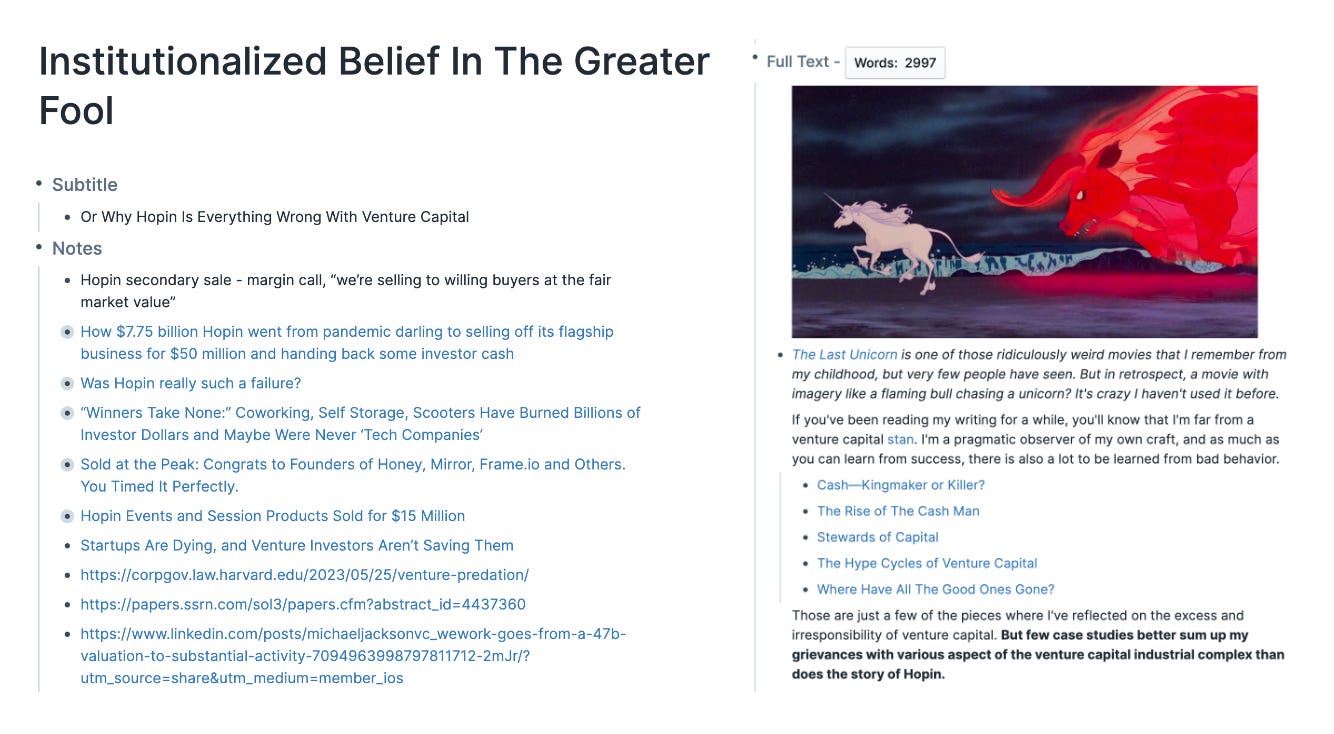This is a weekly newsletter about the art and science of building and investing in tech companies. To receive Investing 101 in your inbox each week, subscribe here:
I've written before about my introduction to Russian literature. That experience eventually led me to Crime & Punishment, which became one of my favorite books. Later, I would have my first moment of writing pride by pseudo-plagiarizing my favorite book for a school paper. Some would just call it "inspired by", so we'll just say that.
The assignment was to write a short story. Everyone in the class wrote one. Mine was called "What's Your Billowy Cloud?" Looking back, it's not a great story. But out of several classes and 100+ short stories, our teacher chose three and took the author names off to share with the rest of the class. Mine was one of the stories.
It was the first piece of writing I had ever done that someone looked at and said, "this is kinda good." At that point, writing felt like a skill worth developing.
It wasn't until I served a mission for my church that the purpose and utility of writing expanded in my mind. I spent two years studying and teaching. As a missionary for The Church of Jesus Christ of Latter-Day Saints, you spent at least 2 hours every day studying.
The experience of dedicated time to study something gave me a new appreciation for knowledge. Writing played two roles in my studying: (1) journal keeping to unpack my feelings on the things I was learning, and (2) record keeping to keep track of the most important information. Each of those two functions were encapsulated by two quotes I wrote at the beginning of my study journals:
Journal Keeping
“While walking in a rapid stream we cannot tread twice in the same water. Neither can we spend twice the same time. When we pass out of that door, the work of this meeting will be closed to us forever. We shall never spend the time of this evening again. Then should we not keep a record of our work, teachings, and counsel that we give? We should.” (Wilford Woodruff)
Record Keeping
“He is wise who knows the source of knowledge—who knows who has written and where it is to be found.” (A.A. Hodge)
Over the course of my 2 year mission I filled 11 study journals with different kinds of notes, quotes, stories, and lessons. Since then, I've been a relentless notetaker. But I still didn't start writing consistently until the beginning of 2022 when I started writing this blog.
Since then, this week marks my 89th time publishing without missing a week. My process has changed a few times, but pretty consistently these days I only write on Saturday. I wake up at 4 or 5 AM, and just panic write until my kids wake up. Then, maybe I stumble through another hour or two after they wake up, trying to write while multi-tasking, getting them breakfast, and all that.
Therefore, What?
So why am I rambling about writing? I had the opportunity to have dinner this week with a number of Contrary Research Fellows, past and present. They asked me the question of how I manage my time between investing, writing, parenting, etc. The question had me reflecting on writing. Then, lo and behold, my friend Frederik Gieschen delivered some exceptional thoughts this week on the same topic.
One section encapsulated the "why" behind writing that comes before the "how." So how does Frederik answer the question of "why do you write?"
"You do it because you don’t know where it will lead and because you can’t know unless you keep doing it.
You do it because you feel you have to, because you can’t help yourself. Because you need to keep going to, hopefully, one day arrive at great work.
In the words of Bukowski, don’t write professionally unless it comes “bursting out of you in spite of everything.”
I, like Frederik, don't consider my writing today to be "great work." But I appreciate the driver of aspiration. Aspiring to write something exceptional. Frederik shares another quote on this idea that struck me:
“We underestimate the cumulative effect of work,” Paul Graham wrote in his essay on doing great work. “Writing a page a day doesn't sound like much, but if you do it every day you'll write a book a year. That's the key: consistency. People who do great things don't get a lot done every day. They get something done, rather than nothing.”
Atomic Units of Thought
So, to the "how." I don't have a 9-part course on writing (and if I did you probably shouldn't buy it). I don't have an extensive process or guide. In fact, if I had to boil down the most powerful building block of my own writing it would be this concept of identifying "atomic units of thought."
Take, for example, one of my more popular recent pieces, "Institutionalized Belief In The Greater Fool." Over the course of weeks I was active on Twitter, Linkedin, took notes in meetings, and made references in podcasts. I collect those references in bits and pieces. Then I put them in Roam.
The reason that I can wake up Saturday morning and panic write for a few hours, and have a half-decent piece with some references and threads of an idea, is because I've made a concerted effort to collect those nuggets. Those atomic units of thought. And I think that's the key takeaway for me.
Writing is a lagging indicator of observation. Those who do not observe have very little to say. Writing is the act of interpreting what you've observed. Trying to make sense of it. The reason I call them "atomic units of thought" are because observations are, in and of themselves, not a thought. Instead, thoughts have to be molded together from those observations.
That's probably why I always come back to this quote that I lead with on my personal website, and that's why I'll end with it here as well:
"I write because I don't know what I think until I read what I say (Flannery O'Connor)
Thanks for reading! Subscribe here to receive Investing 101 in your inbox each week:






Reminds me of how Matt Levine writes: "Panic mode" is the default writing mode of journalists.
"Each weekday, Mr. Levine, 42, wakes up at 5 in the morning. He looks at what’s going on in the markets, scrolls through emails from readers and plugs into the chatter of early-to-work traders. Then he starts to write. Roughly 5,000 words later on a long-winded day, he files Money Stuff to his editor, and it’s sent to subscribers around noon."
Matt: "But mostly I have no repeatable process, I just wake up and panic until there’s a newsletter. I have been doing it long enough that the panic feels less overwhelming; I figure I have a good track record of producing a newsletter every day, so the odds that today’s the day it stops working are low. But I do text my friends most days saying “help I have nothing to write about” or “help I have forgotten how to write” or “help—today’s the day it stops working.”
[1] Columnist Makes Sense of Wall Street Like None Other (See Footnote)—New York Times, https://www.nytimes.com/2020/10/08/business/matt-levine-bloomberg.html
[2] Icebreakers With...Bloomberg Columnist Matt Levine, https://www.morningbrew.com/daily/stories/2021/12/17/icebreakers-with-bloomberg-columnist-matt-levine
This is good read. I've been following the idea of "atomic units of thoughts" and that's my principle. And I really resonate with the quotes from Paul Graham, “We underestimate the cumulative effect of work.”
As a side note, I'm glad to see that you're using Roam Research as your personal knowledge management tool. If you'd like to know the source of knowledge, I'd recommend you to use Glasp, a public repository of the knowledge and exports web highlights into Roam Research.
https://blog.glasp.co/how-to-export-highlights-and-notes-into-roam-research/